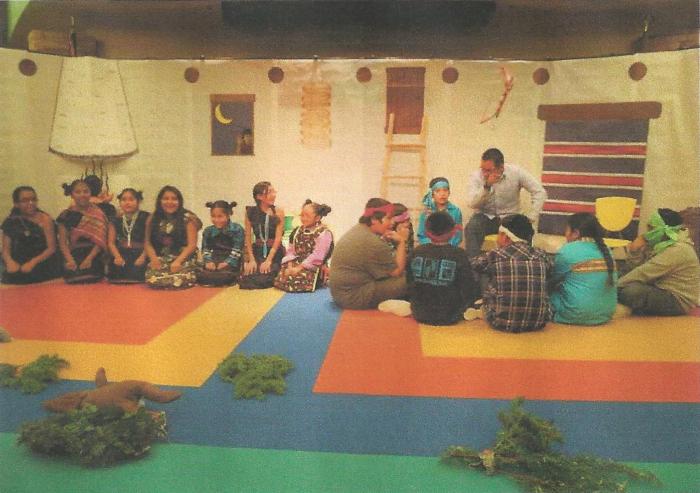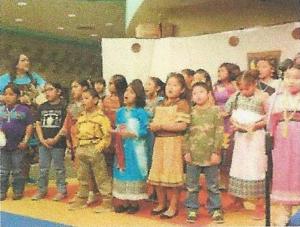 |
Canku Ota
|
 |
|
(Many Paths)
|
||
|
An Online Newsletter
Celebrating Native America
|
||
|
March 2016 - Volume
14 Number 3
|
||
|
|
||
|
First Mesa Elementary
Hopi Lavayi Class Presents Neyangmamaqa Through Performance
|
||
|
by Crystal Dee - Hopi
Tutuveni
|
||
The First Mesa Elementary School (FMES) Hopilavayi Program,
counseling service and the library service hosted a Hopi Storytelling
event and performance on Jan. 25. Radio DJ’s Bruce Talawyma
and Moonie Nuvangyaoma from KUYI Hopi radio, were on hand to broadcast
the event live.
Mrs. Bernita Duwahoyeoma said the event was supposed to be held
during Kyaamuya (The moon of respect), but students couldn’t
sing or use instruments during that time; instead they focused on
storytelling in the Hopilavayi class. “We decided the school would demonstrate respect for the
moon so we held off the event until January, Paamuya, when we can
go crazy and make noise again,” said Duwahoyeoma. Mark Talaswaima, FMES Custodian and volunteer for the program,
said during these hunting parties the boys who did not make a kill
went hungry and were considered bad hunters. “Girls would go
home with the rabbits and cook them.” Talaswaima said he used to participate in these kinds of hunts
as a young boy and would like to see this tradition come back. Students performed two puppet shows called, Tusanhomitsi Tuwavota
and Maanvit niqw Koona; and sang story songs in Hopi. The students
performing in the program were volunteers. “I want to thank the parents for encouraging their child
to participate in the play,” said Duwahoyeoma. “It’s
a big challenge to teach the Hopi language because there are obstacles.” Donald Duwahongnewa and Clark Tenakhongva were guest speakers
and spoke on the importance of tuuwutsi, a story, tale, legend,
myth, fable (Hopi dictionary). “A story can be about your migrations
and history, each clan has their own story,” said Duwahongnewa.“Story
telling is important.” Tenakhongva gave a brief history of himself and how he was brought
up. He is the youngest of ten children and was left behind while
his siblings went off to boarding school. He lived with his parents
and grandparents who taught him everything he knows culturally. “My siblings come to me for cultural advice. They missed
out on these teachings when they left for school off the reservation,”
said Tenakhongva. As a KUYI sports announcer for the high school games (football
and basketball), Tenakhongva said he has sought the help of Duwahongnewa
in finding words to describe the game in Hopi. “All I’m doing is painting a picture of the game for you,” said Tenakhongva. “It is important that we continue to speak our language every day; some of us have suffered for you to get this modern day education.” Duwahoyeoma said when the Director of the Bureau of Indian Education
(BIE), Dr. Charles Roessel announced that he wanted all BIE schools
to start incorporating culture and traditional languages in their
curriculum; she shared the information with FMES Board. “To my surprise, the School Board created a full-time position
for a Hopilavayi instructor and they supported it all the way,”
said Duwahoyeoma. “It was through the School Board’s initiative
that this position was established. There are no grants for it,
but there are monies available to keep this class going.” Louvina Maho, School Counselor assisted Duwahoyeoma with the
program and said Duwahoyeoma never seizes to amaze her with everything
she does for the class and what she is teaching the students. Duwahoyeoma said she believes Maho’s services overlaps
the teachings of the Hopilavayi class becauset Maho focuses on values,
Hopi ethics and cultural teachings of respect for one’s self. “These are the same goals of the Hopilavayi program; which
is to make children feel good and confident,” said Duwahoyeoma. “The children are learning a lot from the Hopilavayi program and I would like to thank Mrs. Duwahoyeoma and Ms. Maho for putting together a great program,” said Alma Sinquah, FMES Chief School Administrator. “I want to encourage everyone out there to stand back and
take a look at the direction that we as Hopi people are going and
if we don’t take the steps to teach these children now, where
is the future of Hopi?,” said Duwahoyeoma. She said this event
was one of the biggest gatherings for parents and the community
in a long time and many stayed to the very end and testified there
is much interest in the Hopilavayi class. The program began with the demonstration of Neyangmamaqa, “a mixed-sex hunting party where girls carry bundles of somiviki to give some to a boy who kills successfully in exchange for his quarry.” (Hopi Dictionary) |
||||
|
|
|
|
||
|
|
||
| Canku Ota is a free Newsletter celebrating Native America, its traditions and accomplishments . We do not provide subscriber or visitor names to anyone. Some articles presented in Canku Ota may contain copyright material. We have received appropriate permissions for republishing any articles. Material appearing here is distributed without profit or monetary gain to those who have expressed an interest. This is in accordance with Title 17 U.S.C. Section 107. | ||
|
Canku Ota is a copyright ©
2000 - 2016 of Vicki Williams Barry and Paul Barry.
|
||
 |
 |
|
|
The "Canku
Ota - A Newsletter Celebrating Native America" web site and
its design is the
|
||
|
Copyright ©
1999 - 2016 of Paul C. Barry.
|
||
|
All Rights Reserved.
|
||

